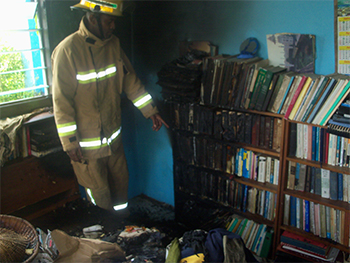National Fire Authority (NFA) is advising business owners to take extra care with the use of dangerous goods or hazardous materials in their workplace. Dangerous goods are solids, liquids, or gases that can harm people, other living organisms, property and the environment.
Dangerous goods are more commonly known as hazardous materials.
Dangerous goods include materials that are radioactive, flammable, explosive, corrosive and toxic materials and it is advisable that business owners who are dealing with these hazardous materials at their workplace must take extra care.
So far this year, out of the 25 property fire incidents, NFA has attended to four commercial property fires of which two property fires were caused by the careless handling of the hazardous material in the workplace.
Business owners must take extra care with the use and storage of any form of hazardous material in the workplace.
It is important that business owners train their staff on how to use these hazardous materials and the material supply data sheet of these hazardous materials must be displayed in the workplace in accordance with the OHS regulations.
NFA CEO John O’Connor highlighted that in one commercial fire incident case this year, employees were working with the hazardous material in the closed compartment of the building when a fire happened as a result of the hazardous material being ignited with oxygen when one of the staff opened the door of the building.
“It is important that business owners train their staff on how to handle any form of hazardous material and be aware of the dangers concerning the use of hazardous material in the workplace and they must also ensure that they store the hazardous materials properly in the building,” Mr O’Connor said. The NFA CEO is also reminding home owners to follow proper fire safety measures at home with the storage of hazardous materials at home.
“Home owners must ensure that they kept the hazardous materials or any ignition sources out of children’s reach and also properly label and store these hazardous materials in a locked cabinet or in a safe storage area so that family members are aware of these hazardous materials and the risk associated with the use of these hazardous materials,” Mr O’Connor added.
People are advised to remember this important hazardous material fire safety measures:
- Flammable/combustible liquids are kept in approved safety containers.
- Flammable/combustible liquids are stored in an approved cabinet.
- Safety storage cabinet vents ate clear of obstructions.
Bush and Rubbish fires
The NFA is also urging members of the community to refrain from starting rubbish or bush fires.
The NFA CEO raised his concerns on bush and rubbish fires after NFA attended to 56 bush and rubbish fires in January 2013.
These bush and rubbish fires start when members of the community carelessly burn their rubbish and leave it unattended causing the fire to spread to the nearby bushes and farms. Other bush fires are intentionally started when members of the community want to clear areas for farming purposes.
Bush and rubbish fires are a great risk to the nearby properties, settlements and villages and can be very devastating to the members of the community and the environment.
Furthermore attending to such bush fire and rubbish fires results in unnecessary expenditure for NFA which compromises the activity and capability of NFA to respond to property fire.
NFA is therefore humbly pleading with members of the community to refrain from starting bush and rubbish fires.

Firefighters show the spread of a fire in a property compartment after attending to this property fire incident in Pacific Harbour. NFA advises people to store goods properly in their properties.



 Join our Facebook page
Join our Facebook page